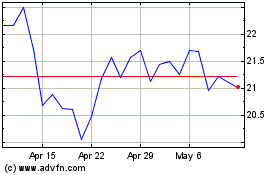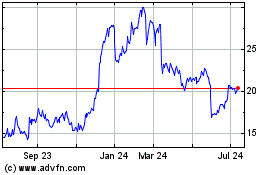TOKYO—Under fire from investors, SoftBank Group Corp. President
Nikesh Arora is stepping down, marking an abrupt end to the tenure
of founder and Chief Executive Masayoshi Son's handpicked
successor.
Mr. Son said he would continue as CEO longer than planned and
Mr. Arora, a former Google Inc. executive whom he recruited two
years ago, will step down to pursue a different path.
"I was thinking of handing over my job as CEO when I turn 60,
but thought maybe I'm still a bit too young, and still have energy
to continue," the 58-year-old Mr. Son said.
Mr. Arora said he will remain as an adviser to SoftBank.
"This will allow me to think about my next move," Mr. Arora
said.
Mr. Son said Mr. Arora wouldn't be reappointed to his position
at Wednesday's shareholder general meeting.
SoftBank was founded as a software distributor in 1981 by Mr.
Son. It acquired Vodafone Group PLC's Japanese operations in 2006,
rebranded it using the SoftBank name and transformed it into
Japan's third-largest mobile-phone service provider. The company is
attempting another turnaround at Sprint Corp., which it acquired in
2013, but those efforts so far have been difficult.
Since joining SoftBank nearly two years ago, Mr. Arora has spent
nearly $4 billion investing in startups around the world in a hunt
for a break-through technology company capable of driving future
growth.
It is too early to tell whether those bets will pay off as well
as Mr. Son's early investments in Chinese e-commerce behemoth
Alibaba Group Holding Ltd. and Japanese internet portal Yahoo Japan
Corp.
Mr. Arora had already come under fire from shareholders over
some of those deals, as well as his compensation, and some
investors had questioned his qualifications. Mr. Arora is one of
the highest-paid corporate executives in the world, receiving $135
million in 2014 and another $73 million last year.
His resignation was announced a day after SoftBank said a
special committee investigating allegations raised by one group of
investors found that the group's claims were "without merit."
The committee, comprised of independent members of SoftBank's
board of directors, was formed in February after the shareholder
group questioned Mr. Arora's track record and suggested that he
faces a conflict of interest in his position because of his role as
an adviser to a private-equity firm.
Mr. Son said Tuesday that the allegations had nothing to do with
Mr. Arora stepping down.
SoftBank announced in March that it would separate its
profitable but slow-growing domestic mobile business from its
fast-paced but riskier overseas operations, the latter led by Mr.
Arora, in a move analysts said could potentially unlock value from
the company's vast portfolio.
Mr. Son said Ron Fisher, a SoftBank board member, and Baer
Capital Partners founder Alok Sama, whom Mr. Arora scouted, will
fill Mr. Arora's role in directing overseas investments.
SoftBank has been on a selling spree in recent weeks as it seeks
to shore up its balance sheet, which is burdened with $80 billion
in interest-bearing debt, about one-third of which is tied to
struggling U.S. mobile-carrier Sprint.
Earlier this month SoftBank announced the sale of $10 billion of
shares in Alibaba, reducing its stake to around 27 % from 32 %. It
also announced the sale of most of its shares in Japanese gaming
company GungHo Online Entertainment in a deal valued at about ¥ 73
billion ($685 million).
On Tuesday, it said it would sell its stake in Finnish game
maker Supercell to China's Tencent Holdings Ltd. in a deal that
values Supercell at more than $10 billion.
Mr. Arora, 48, also served as chief operating officer of
SoftBank Corp., where he was in charge of the company's overseas
operations. He joined SoftBank in 2014 as head of its
Silicon-Valley-based internet and media investment unit.
Before joining SoftBank, Mr. Arora was a longtime executive at
Google Inc., where he oversaw all revenue and customer operations
at the internet giant as well as marketing and partnerships. At
Google, he also served in several other roles, including
development and management of Google's operations in Europe, the
Middle East and Africa. Prior to that, Mr. Arora was chief
marketing officer at T-Mobile Europe.
In June last year, just three weeks after Mr. Son had publicly
anointed Mr. Arora as his heir-apparent, Mr. Arora pulled the
trigger on a $1 billion bet on Coupang, a South Korean mobile
commerce startup, in a deal that was billed at the time as the
largest internet investment in South Korea's history.
The $1 billion investment, which was larger than SoftBank's next
two largest internet deals combined—a $627 million bet on India's
Snapdeal and a $250 million investment in Singapore's
GrabTaxi—instantly doubled Coupang's valuation to $5 billion.
Mr. Arora praised Coupang as "one of the fastest-growing and
most disruptive internet companies in the world."
The $1 billion infusion was widely seen as a knockout punch for
Coupang, which was the country's No. 1 competitor in mobile
commerce, but was embroiled in a brutal fight against two other
well-funded domestic rivals for market dominance.
Instead, less than a year after the investment, Coupang, known
formally by its corporate name Forward Ventures Co., reported an
annual loss of 526 billion Korean won ($456 million), more than
four times its 2014 loss, as Coupang spent heavily to build out an
extensive logistics network that it was betting would differentiate
its "Rocket Delivery" service from those of rivals, including KKR
& Co.-backed TicketMonster.
Jonathan Cheng and Wayne Ma contributed to this article.
Write to Alexander Martin at alexander.martin@wsj.com
(END) Dow Jones Newswires
June 21, 2016 13:05 ET (17:05 GMT)
Copyright (c) 2016 Dow Jones & Company, Inc.
SentinelOne (NYSE:S)
Historical Stock Chart
From Mar 2024 to Apr 2024

SentinelOne (NYSE:S)
Historical Stock Chart
From Apr 2023 to Apr 2024
